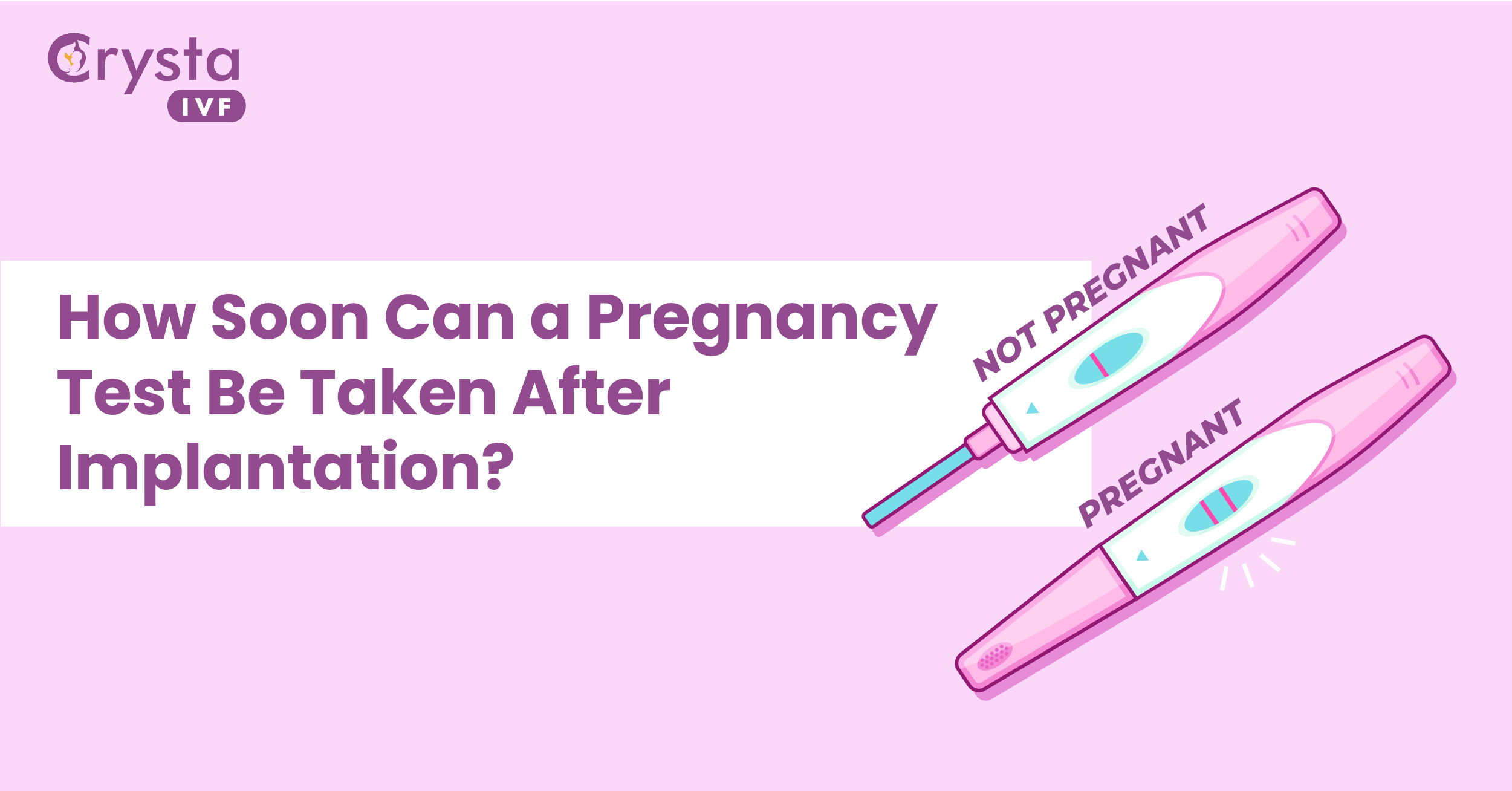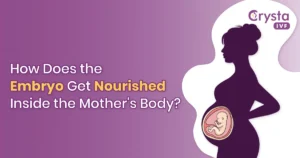When you’re trying to become pregnant, the temptation might be to do a pregnancy test earlier than you should, which can often lead to false results and disappointment. What if your period is a day or so late? Maybe you think pregnant? Are you assuming how soon to do a pregnancy test after implantation?
Well, it is suggested that you take a pregnancy test after 5 to 10 days of implantation, depending on certain factors such as your last period, your implantation success rate and many more. Let’s discuss when to take a pregnancy test after implantation.
What is Implantation?
When a fertilised egg migrates down the fallopian tubes, it becomes a ball of numerous cells (embryo) from a single cell. Then, this group of cells implants into the uterine lining. Following that, it begins growing and developing the embryo and placenta. This embedding is termed implantation.
Implantation usually occurs between eight and nine days after ovulation (when the egg cell leaves an ovary).
What Happens After Undergoing Implantation?
After successful and healthy implantation, the embryo secretes the pregnancy hormone or HCG, which helps the body develop for the pregnancy. HCG is the hormone that is detected in the pregnancy test. At this point, some may understand or feel specific signs of pregnancy.
Some women may experience brown vaginal discharge for 1-2 days after successful implantation. Other women may also experience cramps, swollen breasts, breast discomfort, and breast tenderness on the following days after successful implantation.
Therefore, following implantation, certain challenging activities and workouts may need to be avoided to prevent failure of implantation.
When to Take a Pregnancy Test After Implantation?
Timing is crucial when you are planning for pregnancy. The timing for intercourse, implantation, embryo formation, and baby development, everything is crucial to get pregnant.
Although several tests promise early detection in implantation, accuracy is dependent on your body’s hCG levels. So, depending on the hCG, which test is more accurate, a home urine test or a blood test?
- Blood Test: Provides the most accurate findings by detecting hCG as early as 7 days after implantation.
- In-house Urine Test: Since hCG takes time to accumulate in urine, it is best to take the test 10–14 days following implantation.
The correct response to the question, “How many days after implantation should you test for pregnancy?” is, “Wait at least 10–14 days after implantation or 1-2 days after a missed period for the most reliable result.”
Also, the morning is the ideal time for a pregnancy test since the concentration of hCG in the urine is higher, improving the likelihood of a reliable result. Limiting fluid consumption in advance is advised if testing later in the day to avoid dilution of hCG levels, which could ultimately lead to a false negative result.
Detailed Timeline of When to Take a Pregnancy Test
So, you might get confused about when to take a pregnancy test. Is it done after a missed period, after intercourse, or just after ovulation? Well, here is a detailed timeline of when you can undergo a pregnancy test.
|
Different Circumstances |
Timeline |
| After Ovulation | 7-12 days |
| After Fertilisation | 10-14 days |
| After Implantation | 10-14 days |
| After a Missed Period | 1-2 weeks |
| In a menstrual cycle | 20-26 days |
Note: For a more accurate result, you have to wait for extra time to test for pregnancy. For better results, you can consult a fertility specialist.
Factors That Impact a Successful Pregnancy Test Result
Individual differences may exist in the factors that influence a pregnancy test’s accuracy during implantation bleeding. It can be due to timing, the type of test you are undergoing, and the HCG level. Let’s understand what factors can impact a successful pregnancy result.
-
Timing
The timing is one crucial element. A test that is performed too soon after experiencing implantation bleeding can result in a false or negative result. A pregnancy test must be performed 6 -12 days after implantation.
-
Level of hCG Hormone
The sensitivity of the pregnancy test itself should also be taken into account. Lower amounts of hCG, the hormone generated during pregnancy, can be found in urine or blood samples when the test is taken. Hence, you must wait long enough time to let hCG hormones to form in the body.
-
Medication & Hydration Level
A pregnancy test’s accuracy might also be impacted by excessive medication use and hydration levels. Before a test, consuming too much liquid may dilute your urine, which could alter the results. Hence, it is advised to consult a fertility expert to get a confirmed result of pregnancy.
Hence, it’s crucial to carefully follow the directions that came with your particular pregnancy test. Inaccurate results may arise from improper use or failure to adhere to suggested wait durations.
What are the Signs of a Successful Implantation?
As the first sign of pregnancy might be your missed period. Many women won’t feel any bodily sentiment around implantation. You might not even realize that implantation has taken place.
Women who have had a healthy and successful initial implantation pregnancy may notice light spotting or implantation bleeding ten days after ovulation. However, others may experience light cramping during implantation.
Moreover, due to the improvement in progesterone levels after implantation, some may feel a slight increase in body temperature.
Since you might not understand anything about Implantation, it’s worth existing aware of the other ordinary indications of early pregnancy, which include:
- Constipation
- Nausea and vomiting
- Dizziness
- Feeling faint
- Hurt or swollen breast
- Increased body temperature
- Tiredness
- Cravings for certain food items
- Frequent urination
- Missed menstrual periods
How Soon Should Your Pregnancy Test Be Taken After Implantation?
A pregnancy test is unlikely to be accurate on the day of implantation, as the hormones required to detect pregnancy are still being produced.
While you are pregnant, your body requires time to improve and develop detectable levels of HCG. This process generally takes 7- 12 days after the successful and healthy implantation of an egg. If the test is performed too early in your cycle, you could come up with an incorrect conclusion.
Here are some indications that you should carry out a pregnancy test after implantation:
-
You have missed or skipped your period
One of the first and most sensible signs of pregnancy is a missed menstrual period. If you do not track or follow your cycle approximately, it might be challenging to assume whether or not you’re late or delayed. Several women have a 28-day menstrual cycle but some have a 32-35 day cycle. Therefore, you should consider putting up a test if it has been over a month since the last one.
Remember that your period can be delayed or skipped periodically due to stress or anxiety, an abnormal diet, heavy exercise, or certain medical situations.
-
Your contraception failed
Despite your inception supervision priorities, suppose taking a test if you experience or undergo any of the signs or symptoms of pregnancy. Birth control pills, condoms, and different types of contraceptive devices and equipment do not provide 100% protection and preservation from pregnancy. In other words, there’s constantly an insignificant possibility of pregnancy.
So, if you’re worried and nervous about contraceptive failure, you may take your gynaecologist’s advice about alternative contraceptive methods.
There are some different signs and symptoms of early or initial pregnancy that might prompt you to take a pregnancy test. These may include tiredness, nausea, tender breasts, and, above all, a missed period.
How Can I Tell if it’s Implantation Bleeding or Periods?
It is completely okay to be confused between implantation bleeding and period bleeding, but what if I tell you that you can actually identify what you are experiencing?
Well, take into account the following elements to determine if spotting you experience is implantation bleeding or periods:
- Timing: If the spotting coincides with ovulation and happens before your anticipated period, it may be implantation bleeding.
- Flow: Implantation bleeding is more likely to be the cause if the bleeding is less severe and less painful than your typical period.
- Other Symptoms: Early pregnancy symptoms, including breast tenderness, exhaustion, nausea, or heightened sensitivity to scents, may accompany implantation bleeding.
If you’re still unclear, monitoring your cycle and speaking with a fertility expert in Delhi can help.
What Happens If You Feel Pregnant Despite a Negative Test?
It could be upsetting if you take a pregnancy test and it comes out negative, but you still feel like you’re pregnant. This could occur for a number of reasons, which include:
- Testing too soon: it might be possible that you are testing before hCG levels have increased sufficiently for the test to detect.
- Improper Application: A false negative could also be caused by other factors, such as the test’s sensitivity or improper application.
It’s better to wait a few days and retake the test if you think you could be pregnant. Your body will have more time to create enough hCG as a result.
Takeaway Note
Many women have irregular or unstable cycles due to stress or anxiety, illness, normal variations, diet, or other reasons. Approximately 70% of women attain their fertile window before or later than predicted. It will affect when HCG is detectable in your urine. Therefore, if you ovulate one week later than expected, your implantation will be delayed and you will be required to wait an extra week to get a positive pregnancy test.
Frequently Asked Questions
Ques. After how many days can a urine test confirm pregnancy?
You can usually confirm pregnancy with a urine test about 14 days after ovulation or around the time of your missed period.
After implantation, the body starts producing hCG (the pregnancy hormone), and it takes about 5-7 days for hCG levels to be high enough to show up on a urine test. Most home pregnancy tests can detect it by the time your period is due.
Ques. How soon after unprotected intercourse can I test for pregnancy?
You should wait at least 2 weeks after unprotected sex to take a pregnancy test for the most accurate result. Pregnancy doesn’t happen immediately after sex. It can take a few days for fertilisation and implantation. Testing too early can give a false negative.
Ques. How soon pregnancy test be taken before a missed period?
Some sensitive pregnancy tests can detect pregnancy 5–6 days before your missed period, but it’s better to wait at least 1-2 days before your expected period for a more reliable result.
Ques. How soon pregnancy test be taken after missed period?
You can take a pregnancy test after a week of missing your period for accurate results. By this time, hCG levels are usually high enough to be detected in urine, giving you a trustworthy result.
Ques. How soon pregnancy test be taken after IVF?
After IVF embryo transfer, a pregnancy blood test (beta hCG) is usually done 10 to 14 days later. Testing too early can give false negatives. Blood tests are more accurate after IVF because they can detect even small amounts of hCG.
Ques. Can implantation bleeding affect pregnancy test results?
No, implantation bleeding does not affect the result of a pregnancy test. Pregnancy tests work by detecting hCG hormone in your urine, not by checking for bleeding. However, if you test too early (before enough hCG has built up), you might get a false negative.
Ques. Can you have a negative test after implantation and still be pregnant?
Yes, it is possible to get a negative test even after implantation and still be pregnant. This is because it takes time for hCG levels to rise enough to be detected. If you test too soon after implantation, the result may be negative.
Ques. How do I know if implantation was successful?
You might notice light spotting, mild cramps, or feel slightly tired, but there are no sure signs. Successful implantation doesn’t always show obvious symptoms. The only way to confirm pregnancy is by taking a test after a missed period.
Ques. Is it better to take a pregnancy test in the morning?
Yes, it’s better to take the test with your first morning urine. Morning urine is more concentrated and contains higher levels of hCG, making it easier to detect pregnancy early.
Ques. Can I take a pregnancy test 7 days after ovulation?
Yes, you can take a pregnancy test 7 days after ovulation but it’s too early. You should wait at least 12–14 days after ovulation. It takes time for fertilisation, implantation, and enough hCG production to happen.
Ques. Does drinking water before a pregnancy test affect results?
Yes, drinking too much water can dilute your urine and affect the result. Diluted urine may lower the concentration of hCG and could cause a false negative. It’s better to test before drinking lots of fluids.




